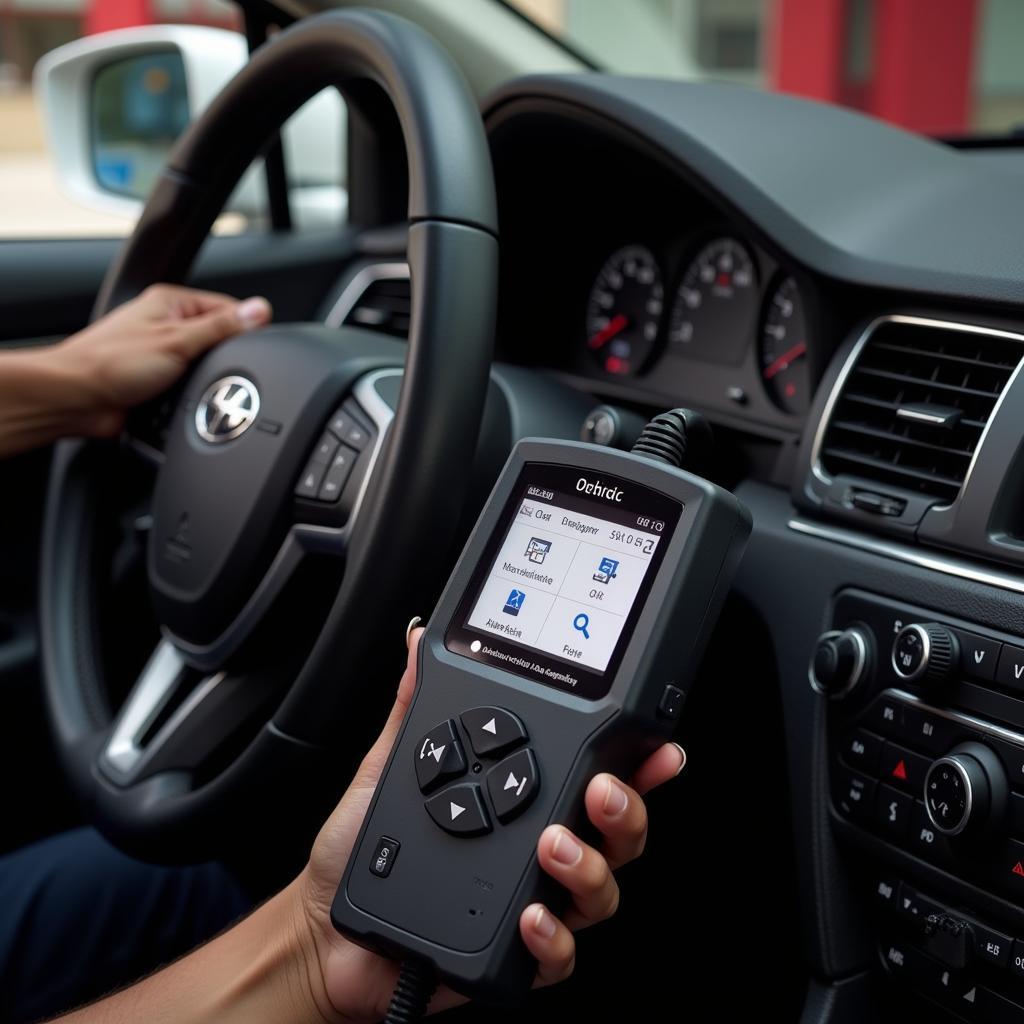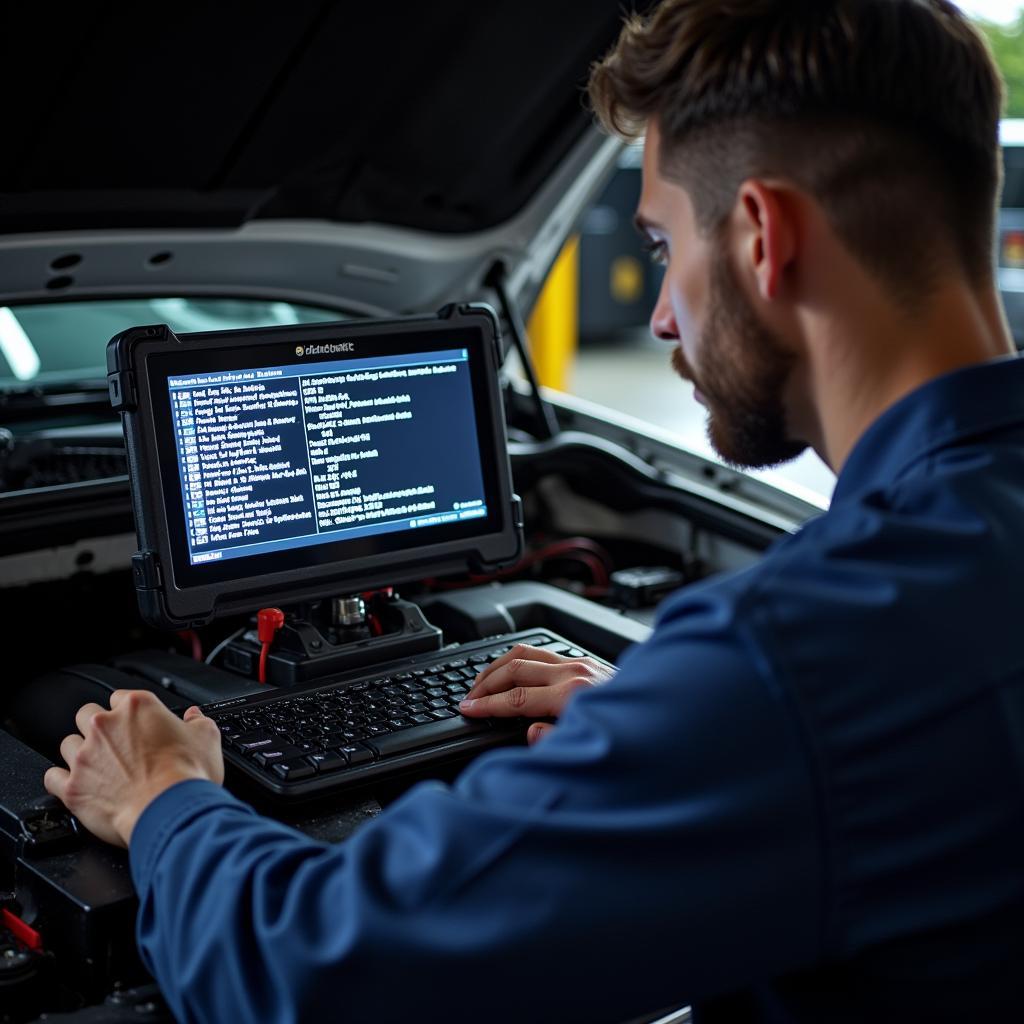Modern vehicles are complex machines with intricate systems monitored by an onboard computer network. When a warning light pops up on your dashboard, it signifies an issue that the car’s computer has detected. This is where a car diagnostic test comes in.
A car diagnostic test, also known as an OBD-II scan, delves into your car’s computer system to pinpoint the root cause of the issue. It’s like giving your car a comprehensive health checkup. But what exactly does it check? This article breaks down the components and systems typically covered in a standard car diagnostic test.
Unveiling the Mysteries: What a Car Diagnostic Test Checks
Contrary to popular belief, a car diagnostic test doesn’t just provide a general overview. It digs deep into various systems, reading data from numerous sensors and components. Here are the key areas a diagnostic test usually covers:
-
Engine: The heart of your car, the engine, is heavily scrutinized. The test evaluates the performance of various components like spark plugs, fuel injectors, and the overall air-fuel mixture. It also checks for issues related to emissions.
-
Transmission: A smooth-shifting transmission is crucial for a comfortable drive. The diagnostic test examines the transmission system for issues related to gear shifting, fluid pressure, and clutch performance (in manual cars).
-
Brakes: A critical safety system, the brakes are thoroughly examined during a diagnostic test. The test checks the performance of ABS (Anti-lock Braking System), traction control systems, and the overall hydraulic system.
-
Exhaust System: This system plays a vital role in controlling emissions. The test analyzes the oxygen sensor data, catalytic converter efficiency, and the overall health of the exhaust system.
-
Airbag System: Another critical safety component, the airbag system, is checked for faults. The test ensures that all sensors, modules, and deployment mechanisms are functioning correctly.
-
Other Electronic Systems: Apart from these major systems, the diagnostic test also scans for faults in other electronic components like power windows, door locks, and the entertainment system.
 Car Diagnostic Equipment
Car Diagnostic Equipment
Deciphering the Results: Understanding Diagnostic Trouble Codes
A car diagnostic test doesn’t speak plain English. Instead, it communicates through Diagnostic Trouble Codes (DTCs). These are alphanumeric codes that correspond to specific issues detected within the vehicle’s systems.
For instance, a code like “P0301” indicates a misfire detected in cylinder 1. While some codes might seem straightforward, many require a mechanic’s expertise to interpret correctly.
 Mechanic Analyzing Diagnostic Results
Mechanic Analyzing Diagnostic Results
Benefits of Regular Car Diagnostic Tests: Why It’s a Smart Move
Think of car diagnostic tests as preventative healthcare for your vehicle. Here’s why they are beneficial:
- Early Detection: Diagnostic tests can detect problems before they escalate, saving you from potentially expensive repairs down the line.
- Accurate Diagnosis: Guesswork has no place in car repairs. Diagnostic tests offer accurate information, guiding mechanics towards the precise issue, saving time and money.
- Improved Fuel Efficiency: Addressing issues like a faulty oxygen sensor can significantly improve your car’s fuel economy.
- Increased Safety: Regular diagnostics ensure critical safety systems like brakes and airbags are in optimal working condition.
Beyond the Basics: What Else You Should Know
While this article covers the essentials, it’s important to note that the depth of a car diagnostic test can vary. Some advanced tests might delve into more specific system parameters.
If you’re experiencing car trouble, or your dashboard warning lights are flashing, don’t hesitate to get a car diagnostic test. It’s a small investment that can potentially save you significant time, money, and stress in the long run.
FAQs about Car Diagnostic Tests
Q: How much are car diagnostics?
A: The cost of car diagnostics can vary depending on the mechanic, location, and complexity of the issue. To learn more about the average costs, you can read our detailed guide on how much are car diagnostics.
Q: Can I perform a car diagnostic test myself?
A: While DIY car diagnostic tools are available, they might not offer the same depth and accuracy as professional-grade equipment.
Q: How often should I get a car diagnostic test?
A: It’s generally recommended to get a diagnostic test done annually or whenever your car exhibits unusual behavior or warning lights illuminate.
Q: Do car diagnostic tests drain the car battery?
A: No, car diagnostic tests consume minimal battery power and shouldn’t drain your battery.
Q: What if the check engine light turns on after a diagnostic test?
A: If the check engine light persists even after addressing the identified issues, it indicates an unresolved problem that requires further investigation.
Exploring Further: Delving Deeper into Car Diagnostics
For those keen on understanding more about car diagnostics and related topics, we have a wealth of resources available:
- How Much Does a Car Diagnostic Machine Cost?: This article explores the various types of car diagnostic machines and their costs, catering to both DIY enthusiasts and professionals: how much does a car diagnostic machine cost.
- How to Install a Car Diagnostic Machine: This comprehensive guide provides step-by-step instructions on setting up and using a car diagnostic machine: how to instal car diagnostic machine.
Need Expert Assistance? We’re Here to Help!
Is your car acting up and you’re not sure what’s wrong? Don’t hesitate to reach out to our team of car diagnostic experts. Contact us via WhatsApp: +1(641)206-8880, Email: [email protected]. We offer 24/7 support to get you back on the road safely and quickly.

Leave a Reply